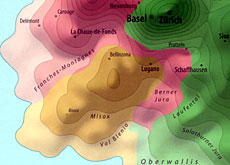
New atlas plots Swiss political landscape

When it comes to voting patterns, the Swiss regions are far apart, as the results of federal referenda over the past 20 years show.
A new atlas illustrating Switzerland’s political landscape plots the main demarcation lines in the country.
In recent decades, geography has extended its scope. Instead of simply studying and describing natural features such as mountains, lakes and rivers, geographers now increasingly focus their attention on the relationship between people and their environment.
This trend has produced some unfamiliar maps of Switzerland, in which towns and cantons no longer seem to be in their right places, cities are transformed into mountains and alpine areas into flat land.
In their Atlas of the Political Landscape, Michael Hermann and Heiri Leuthold skilfully use the tools of cartography to give a picture of the political positions and attitudes of the Swiss people.
The points of the compass which emerge from the study conducted by these two researchers from the Department of Geography at the University of Zurich are somewhat unconventional: West represents the political Left, East the Right; North corresponds to liberalism, South to conservatism.
How else could Zurich be located west of Bern, or Geneva north of Basel?
Public opinion polls
In defining the political geography of Switzerland, Hermann and Leuthold based their work on data derived from the 184 federal referenda held between 1982 and 2002.
The two academics say the results of these referenda should not be seen merely as political decisions, but as valuable surveys of public opinion: an average of two million people vote on the issues concerned, providing a broad-based, anonymous and representative sample.
But why not simply use the results of federal elections, which clearly reveal the political colours of each locality and canton?
“In elections, people base their choices on personalities or party programmes. The results of referenda, on the other hand, provide a more direct and transparent reflection of public opinion,” explained Leuthold.
“Moreover, popular initiatives reflect a far wider range of topics, compared with the issues covered by political parties in their election campaigns.”
Dividing lines
According to the geographers, from these issues it is possible to discern three broad areas of conflict. In other words, they reveal three lines of demarcation between opposing poles: left–right, liberal–conservative, and ecological–technocratic.
Almost 15 years after the collapse of the Berlin Wall, Switzerland is still largely split along lines reflecting the left- and right-wing ideologies of the Cold War, the authors claim.
“From the results of the referenda, there emerges a clear pattern of disagreement on such fundamental issues as the welfare state, the market economy, the army and the police,” said Leuthold.
Seen in this way, almost all of French and Italian-speaking Switzerland stands on the political Left, while the German-speaking cantons occupy traditional right-wing ground, with the exception of Basel, Zurich, Bern and Fribourg.
Blurring the boundaries
Conflict between liberals and conservatives arises over such issues as openness to the rest of the world, the integration of foreigners, institutional reform, and traditional forms of regulation.
But the maps in the atlas reveal interesting disparities. For instance, the frontier between the liberal and conservative mentalities does not necessarily correspond to the dividing line between Left and Right.
“If we take the wealthy districts of Zurich as our example, the Right can be liberal in outlook and open to the outside world when its economic interests are affected. Meanwhile, left-wing regions take the same view as conservative areas on issues regarding the reform of government or public services,” observed Leuthold.
Similarly, the dividing line between ecologists and technocrats does not necessarily reflect left- and right-wing persuasions.
“Strongly left-wing areas in canton Jura have a much less ecological profile than many parts of Zurich which vote for the Right.”
Growing gulf
The revealing snapshots of Switzerland’s political geography reproduced in the atlas bring out many significant shades of opinion and values within regions.
They also highlight the major differences: the cultural divide between linguistic regions, and the gulf between urban and rural areas, especially in German-speaking Switzerland.
“We are seeing a growing polarisation: the cities attract people of liberal and left-wing convictions, while a conservative, right-wing spirit predominates in the countryside. The difference is immediately apparent once you get beyond the agglomerations,” observed Leuthold.
Our environment plays a diminishing role in forming our view of the world. In the old days, people born in rural areas were virtually predestined to adopt the political outlook of those around them. But with today’s high degree of social mobility and modern means of communication, the Swiss are now far less likely to be conditioned by their background.
“Nowadays, differences between town and country are mainly due to the fact that many people choose where they live, albeit unconsciously, depending on their values and view of the world,” commented Leuthold.
swissinfo, Armando Mombelli
The Atlas of Political Landscape divides Switzerland along political lines.
The authors relied on data derived from the 184 federal referenda held between 1982 and 2002.
In the atlas, West represents the political Left, East the Right, North stands for liberalism and South for conservatism.
The authors say that almost 15 years after the collapse of the Berlin Wall, Switzerland is still largely split along Cold War ideological lines.
They say there is a growing political polarisation between Switzerland’s cities and the countryside.

In compliance with the JTI standards
More: SWI swissinfo.ch certified by the Journalism Trust Initiative


























You can find an overview of ongoing debates with our journalists here . Please join us!
If you want to start a conversation about a topic raised in this article or want to report factual errors, email us at english@swissinfo.ch.